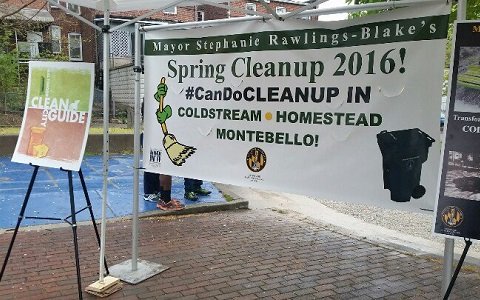BALTIMORE — The Baltimore City Department of Public Works (DPW) recenltly announced the availability of a new simple-to-use guide that will make it easier for everyone to keep Baltimore’s neighborhoods clean.
“I am delighted to announce the release of the new Baltimore City Clean Guide — a project led by the City’s new Clean Corps Initiative and their nonprofit and City partners. This guide will make sure communities know what to do and who to call when they are seeking resources to keep their neighborhoods clean,” said DPW Director Rudy Chow, P.E., during an event to kick-off the start of the Mayor’s Spring Cleanup,
This 24-page guide includes resources and phone numbers so that citizens know who to call when they need City services. Copies of the guide were made available to residents of the Coldstream-Homestead-Montebello community, where City leaders gathered to kick off the Mayor’s 17th Annual Spring Cleanup.
The Baltimore City Clean Guide is now available on DPW’s website, http://publicworks.baltimorecity.gov/.
More than 5,700 citizen volunteers representing 256 neighborhoods across Baltimore City participated in this year’s Spring Cleanup. This is the largest number of registrants and volunteers that have participated in the Mayor’s Spring Cleanup in nearly a decade.
Representing Mayor Stephanie Rawlings-Blake, Director Chow was joined by representatives from the Departments of Transportation, Recreation and Parks, and Baltimore City Health Department. Each year, these departments work together to host the Mayor’s Fall and Spring Cleanups.
Clean Neighborhoods Keep Mosquitoes Away
Health Department Officials also shared information on the importance of properly disposing of litter and trash that can cause water to collect as the mosquito season approaches.
“It is critical that we keep our yards and neighborhoods clean as we take steps to protect Baltimore City residents from the potential spread of Zika virus this spring,” said Baltimore City Health Commissioner Dr. Leana Wen. “There is no vaccine and no cure for Zika. That’s why the key to preventing Zika is stopping the spread of mosquitoes by removing standing water. Even a small bottle cap can be breeding ground for mosquitoes. Every citizen can help keep Zika out of Baltimore by covering empty containers and removing unnecessary items like empty tires from our yards. Together, we can decrease mosquitoes and ensure a cleaner, healthier, more vibrant city.”
To learn more about the Zika Virus, including information for women who are, may become pregnant, and their partners, as well as tips to prevent the potential spread of the virus, please visit: http://health.baltimorecity.gov/zika-virus/.
The CDC has additional information including the latest travel guidance, available at: http://www.cdc.gov/zika/.
